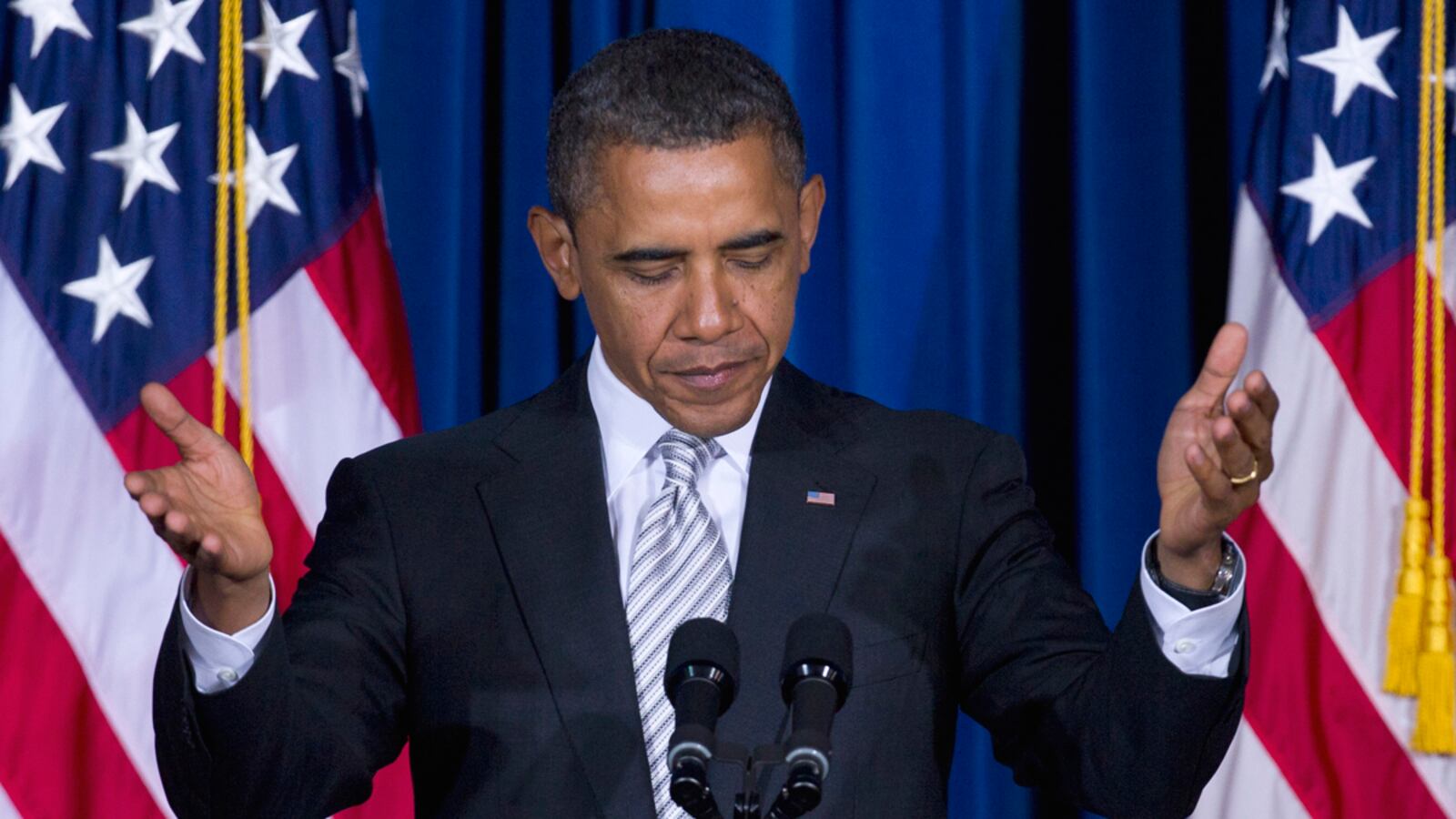On key issues from health-care reform to the stimulus, President Obama has time and again sacrificed his agenda in the pursuit of Republican support that has failed to materialize. Rather than express his anger at Republicans, however, he has repeatedly evaded conflict by moving his position closer to the opposition’s without acknowledging that theirs wasn’t moving in return. For an explanation for this, we must look to his unconscious motivations, where we find that he is burdened by a psychological condition known as “pathological accommodation.”
A problem-solving method we all learn in childhood, accommodation describes a lose/win scenario in which one individual gives up what he or she needs in order to do what the other wants. Accommodation becomes pathological when it continues in the absence of evidence that it will be rewarded with even partial victory or satisfaction. The individual experiences anxiety at the thought of a threat to the person or relationship that is being accommodated; pathological accommodation expresses the individual’s deep unconscious need to protect the self against inner chaos in the face of that anxiety. This is particularly powerful in the parent/child dynamic in broken homes, where the child may defend against the pain of losing the absent parent—or the anticipated pain of losing the second parent—by taking on the belief system of the parent who remains.
Raised without a father figure for much of his childhood, Obama has not been reticent about articulating his attachment to his mother; in the introduction to the preface to the 2004 edition of Dreams From My Father, he refers to her as “the single constant in [his] life” and “the kindest, most generous spirit” he has ever known. But a close analysis of Dreams From My Father and other published remarks about his mother reveals a pattern of unconscious rage toward his mother that he never expressed. Now that she exists only as a cherished memory that he must preserve and protect for his own sense of self, Obama unconsciously defends against the complete loss of his mother that he fears would occur if he truly acknowledged that rage.

Childhood pathological accommodation often leads to adult aversion to confrontation, which is the pattern that we see in Obama’s repeated accommodation of his Republican rivals. When he pre-emptively appeases Republicans, Obama is not just perpetuating his well-documented, lifelong impulse to create unity by helping divergent groups find areas of common ground: he is operating under the influence of a psychological conflict described here for the first time—“obsessive bipartisan disorder.” His first two years of dogged pursuit of evasive Republican support in the face of unwavering and hostile opposition is best understood not as naiveté or faulty political strategy but as the sometime puzzling outward manifestation of this fundamental organizing principle of his psyche. He must protect himself from fully experiencing the destructive intent of these attacks in order to maintain his sense of calm and self, a pattern he learned in childhood while accommodating and suppressing his rage toward the mother on whom he depended.
This isn’t to say that bipartisanship is on its own either pathological or a disorder. Obama’s dream of one America certainly holds a powerful resonance for many of us. But bipartisanship is politically expedient only when it gets results, when both sides give in order to get something they both want. And when an otherwise effective individual continues to pursue an object or result after every attempt is rejected, that pursuit is seen as acquiring the attributes of an obsession, in that it appears to be a self-destructive pattern motivated by unconscious drives. The outward manifestations of Obama’s obsessive bipartisan disorder—the one-sided compromises, rebuffed advances, and ignored calls to pursue inquiries into Republican and financial-industry malfeasances—may seem only like ineffective policy, but a psychoanalytical perspective shows us that Obama’s internal force compels him to sacrifice effective policy to sustain the unconscious belief that his accommodation will be rewarded.
Some may argue that he’s right to be obsessed; after all, he has passed more new legislation than any Democrat since LBJ—although many find his health-care, financial-reform, and other bills to be fatally compromised. Observers who share Obama’s background in community organization might also see nothing pathological about his approach. His relentless pursuit of compromise is certainly consistent with a community organizer’s mind-set—indeed, is perhaps more reminiscent of a chief organizer than a chief executive—as is his vision of living in a community that tolerates difference and continues to grow. But even a community organizer can’t be effective when one segment of the community is as uncooperative as the Republican leadership has proved itself to be.

Seen in its full and unprecedented destructiveness, the Republicans’ position that preventing Obama’s re-election is a higher priority than governing is so dangerous as to transform Obama’s vision of community into a perilous and misleading fantasy. Trying to accommodate individuals so committed to his destruction is unhealthy—the obsessive and disordered elements of his notion of bipartisanship. Behind Obama’s persistence we see factors fuelling his bipartisan disorder that date back to his early years as the mixed-race child of two broken homes—particularly his drive to integrate his black and white selves and his need to reconstitute his family of origin. His search for family both defends against his rage at the parents who let him down, and rehabilitates the image of his father, whose dramatic diminishment Obama chronicled in his first memoir. Avoiding the mistakes of his father, Obama Sr., he has created a deeply connected and loving family of his own with Michelle, and keeps trying to do the same with the American people.
Obama’s obsessive need to accommodate can be heard in his words today, from great speeches to minor spontaneous remarks, in which he compulsively mentions what people have in common, whatever the circumstances of his remarks. Even in the moment of his most uncharacteristically decisive triumph, the killing of Osama bin Laden, he emphasized American unity, talking about how “the American people came together” on 9/11, when “we were united as one American family.” In these moments, the illusion of unity at the heart of his obsessive bipartisan disorder offered a familiar defense against recognizing his capacity for rage and murderousness.
When he authorized bin Laden’s killing, Obama was protecting his American family by eliminating its greatest sworn enemy. But it’s hard to be a father figure if one has never felt anger at one’s own father, and Obama’s father was not around during his childhood to model the healthy expression of anger. Now, as decisive as the bin Laden raid demonstrated Obama can be, he can’t manage to confront the destructive hatred directed against him within his national family here at home. By evading that part of his personality, Obama is doing the nation a disservice, giving us an accommodator-in-chief when we need a decisive commander.
In recent weeks, after introducing the American Jobs Act, Obama started to attack his opponents directly, in fiery, finger-pointing speeches that for the first time call out Eric Cantor and Mitch McConnell by name. This shift goes beyond the predictable change from President to Candidate Obama, the person so many voted for in 2008. But it remains to be seen if this shift in demeanor will go beyond rhetoric. If it does, then his obsessive bipartisan disorder may be diminishing thanks to the power of his new psychotherapists, the Republican leadership.





